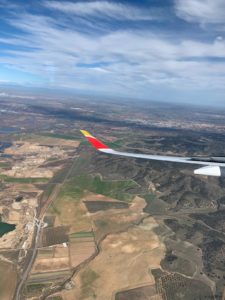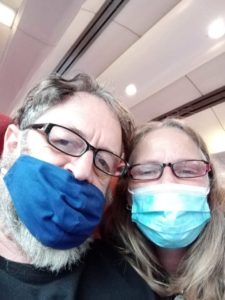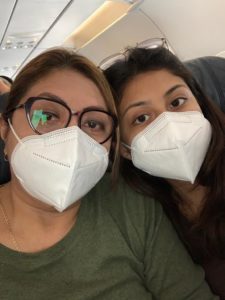The UK government’s recent announcement regarding quarantine hotels for visitors from abroad has caused panic among some travellers.

The measures are an attempt to reduce the spread to the UK of new Covid-19 variants from 33 red list countries around the world.
The system, similar to the one in Australia, means a hefty price tag of around £1800 per person for the mandatory 10-night stay.
And as the government won’t pay for the tests that travellers from these countries need to have, the actual cost per person will be closer to £2000.
The rush to beat the deadline of the 15th saw five-hour long queues in Heathrow and other major airports. Those who did arrive in time were still required to provide a negative test result, fill in a passenger locator form, and isolate for ten days upon arrival.
Here are the stories of three travellers who arrived the week before quarantine hotels were implemented.

Sally and Richard Martin are a couple from South Africa who had been planning to immigrate to the UK long before COVID struck, so when the government began discussing the idea of quarantine hotels they decided to speed up their departure.
Sally explained, “we were incredibly anxious that they would suspend flights altogether, that there would be no entry into the UK.” With their ancestral visa in hand, they rushed to get tickets.
“I gave my employer three days’ notice and told them that I had to leave immediately, otherwise I would not be able to get out of the country”, said Richard.
And it was fortunate for them that they left when they did, because it was as they started their journey that flights out of South Africa were cancelled.
“We heard the news while we were at the airport…” said Richard. “I immediately contacted my travel agency, but luckily our flight was unaffected. We were very relieved. Leaving your country to go to a new one is incredibly traumatic at the best of times.”
The couple explained that they would have had to borrow the money to pay for a quarantine hotel. “It would have made it very difficult to start a new life with debt,” said Richard.
Monica Pluas, an East London-based student, struggled to return to the UK. She arrived on the 13th of February, narrowly missing the hotel quarantine. “I reserved two tickets and the next day when I went to pay for them they were sold out,” explained Monica, “So, yeah, it was really hard to find a way back.”

Her journey meant taking four flights and took over 22 hours; and when she did arrive, there was confusion at the airport. “I have a Spanish passport, but they blocked my passport. They said that I have to go through security. The lady was, oh, where are you coming from? And I was like, Ecuador. She was very confused because she didn’t even know if I could enter the country.”
After a long wait Monica was allowed through and advised to self-isolate, but the experience has left her shaken. “Oh my God, I thought they were going to send me back and then on the 15th I will have to come back here and go to the hotel.”
She explained that with her and her mother staying at a hotel and paying for tests, it would have been too expensive. “That would have been almost two months of rent,” she said.
Justin Bennewith, an American coming to the UK on a spousal visa, arrived in Edinburgh on the 14th, just one day before the hotel quarantine rules kicked in, which in Scotland apply to anyone flying in from anywhere at all, not just the countries on the red list.
His journey out was as fraught as Monica’s, meaning he had to queue for two hours, almost missing his flight. “The people knew that they had to be there by a certain time, by a certain day, and there was a rush to get in.”
Justin also wouldn’t have had enough funds to pay for a hotel. “We would have had to borrow the money. We would have put it on a credit card and then figured it out afterwards,” he said.
America has had over 27 million COVID ases but is not on the UK’s red list. “in America they don’t take coronavirus too seriously, not as seriously as the UK”, said Justin.
What these interviews show is that for many people the issue isn’t just safety it’s money, and that now that the new measures have begun cancelled planes and lack of cash mean that a lot of people will simply have to stay at home, however urgent their reasons for travelling might be.

